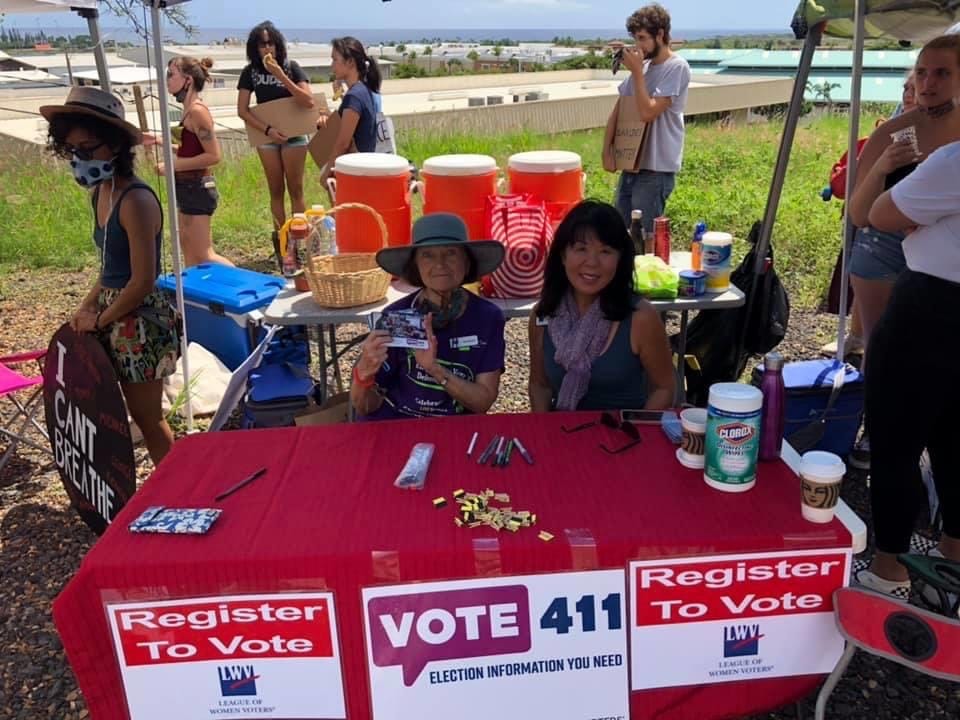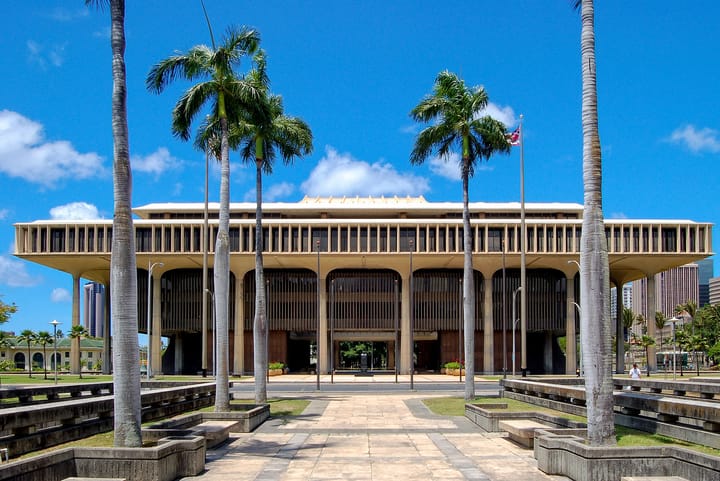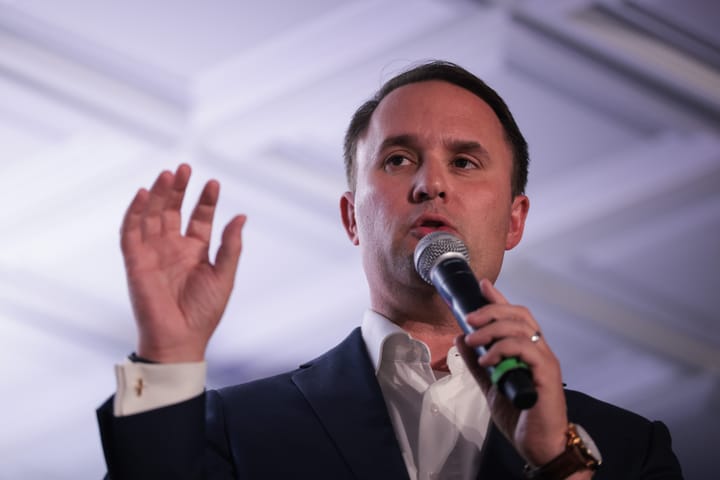For the second year in a row, Hawaii lawmakers are considering a major election reform bill that proponents say would reduce the influence of wealthy donors in state politics by enhancing the state’s system of public campaign financing.
The bill, called Clean Elections by a coalition backing it, would establish what it calls a “comprehensive” public campaign financing option in the state, meaning it would aim to provide candidates enough money to be competitive without needing additional funds. Supporters of the program say it would encourage a larger candidate field for state and local offices, spur more candidate interactions with voters, and curb the amount of campaign cash coming from industry-connected donors.
But last year, Hawaii good government groups saw a closely similar bill expire behind closed doors in the state Senate Ways and Means Committee. The 2023 bill was killed even as Hawaii’s political leaders were weighing sweeping reforms to strengthen ethics in state government—about a year before, two former state lawmakers pleaded guilty in a bribery scheme.
This year, the Clean Elections bill, numbered SB 2381, has taken a different path in the Hawaii legislature. It was advanced earlier this month by a pair of state Senate committees and passed the Senate unanimously on Feb. 20. The measure was introduced by Senate Judiciary Chair Karl Rhoads—and was recently reported in USA Today to have the support of House Speaker Scott Saiki.
Now, the fate of the bill lies with the Hawaii House of Representatives. No hearings have yet been scheduled for the bill, leaving coalition members to closely watch the legislative schedule in the weeks ahead. If the bill is passed by the House and signed into law by Gov. Josh Green, a Democrat, the public campaign funding program would first be offered in the 2028 election cycle.
Sludge inquired with Saiki’s office as to whether the Clean Elections bill could expect to be scheduled for House hearings this year, and did not receive a response.
Common Cause Hawaii, a nonpartisan good government group, is a leading member of the Clean Elections Hawaiʻi Coalition that has been mobilizing Hawaii residents and policy researchers to submit written testimony to help the measure pass the legislature. Some other members of the coalition include Indivisible Hawaii, the League of Women Voters of Hawaii, and Lāhainā Strong, a group of small business owners affected by the Maui wildfires of 2023.
“It is important for anyone, especially an elected official who says they believe in expanding access to democracy, to support public campaign financing,” said Camron Hurt, program manager of Common Cause Hawaii. “Anything else would just be paying lip service to a critical issue in this state—we have lacked comprehensive anti-corruption reform, even though we’ve been plagued by corruption over the past decades.”
“It is time for our legislators to decide—are they anti-corruption or are they beholden to special interests,” Hurt said.
Above: Instagram post by Clean Elections Hawaii after SB 2381 passed in state Senate committee
The proposal’s design is similar to state public campaign financing systems in Maine, Arizona, New Mexico and Connecticut that offer campaign funding to candidates who opt-in and demonstrate sufficient voter support. A report on the bill that was prepared last year by political scientist Colin D. Moore of the University of Hawaii at Mānoa found a consensus in scholarship that such programs improve electoral competition and lead to greater diversity among both candidates and donors.
The bill would allow participating candidates who gather a certain amount of $5 donations from voters to qualify for grant funding to run their campaigns. For example, state House candidates could qualify for up to $50,000 in funding by obtaining donations from 125 contributors, and candidates for governor could be eligible for grants worth up to $2.5 million by securing 6,250 qualifying contributions. Office seekers who opt in would need to abide by reporting requirements, be barred from further private fundraising, and observe limits on total spending to ensure that the public funding was comprehensive in fueling their run.
The grant funding proposed in the bill aims to level the playing field between incumbent politicians and newcomers. Incumbents in the Hawaii House spent an average of $57,883 on each election since 1994, while their challengers spent only $16,500 in dollars adjusted for inflation, according to Moore’s report. On average, 90% of incumbents won their re-election bids over the past decade, according to the report’s analysis of the data from the Hawai‘i Campaign Spending Commission.
Hurt says the bill is needed because the current campaign finance laws empower wealthy interests. “In the age of the Citizens United decision, it is important for states to be proactive in how money is allocated in elections,” Hurt told Sludge. “We’re making a commitment to take big money influence out of our elections and truly let them be decided by the people.”
The Clean Elections Hawaiʻi Coalition sent a letter to every Hawaii legislator last fall with a legislative reform agenda. Hurt said that the outpouring of public testimony—leaping from 146 letters last year to 269 letters this year in support of the measure, and with overall testimony running above 500 pages—helped it advance through the Senate.
In his testimony this month, Hurt emphasized that a public funding system would allow elected officials to work on behalf of their constituents, “without being beholden to fundraising.” A July 2022 poll by Data for Progress found that of more than 1,000 Hawaii voters, 74% expressed support for a candidate who would vote to establish a public campaign financing program.
Hawaii Rep. Jeanné Kapela, the first Native Hawaiian to represent her district, told Sludge that public funding for campaigns stands to increase participation in state elections by Native Hawaiians and working-class residents.
“Establishing a clean elections program for Hawai’i is essential to advancing the public’s interest. Too often, big money donors are able to buy influence at the legislature through campaign cash, preventing the voices of working families from being heard,” Kapela said.
Above: Instagram post by Rep. Jeanné Kapela after testifying in support of clean elections
“Native Hawaiians and other racial minorities are underrepresented in government, in part because they lack the means to participate in local politics,” Kapela said. “This continues the historic repression of Hawaiian voices within our homeland, while the corporations that have suppressed our communities are able to buy access to power that further entrenches their influence over our land and our livelihoods.”
“Native Hawaiians rank low in most statewide social metrics, including income level, educational attainment, and public health,” Kapela said. “If we want to uplift the well-being of the Hawaiian community, we must empower them with the resources they need to assert themselves in the political process.”
Hawaii voter turnout recently fell to a record low: in the 2022 election, under half of state voters cast ballots in the state’s general election, which included a race for governor. While Hawaii has had a partial public campaign financing system for state elections in place since 1979, its matching funds have been used by only a small number of candidates in recent cycles, Moore’s report found, issuing just $71,878 in the 2022 election.

The Clean Elections bill would allocate $30 million each general election year. The total amount disbursed to candidates could be lower—the Clean Elections coalition estimates that even with robust participation the grants might total less than $10 million a year, or under 0.05% of the state budget. Connecticut’s grant system, for comparison, even with a high rate of candidates participation paid out $13.5 million in the 2020 election, according to Moore’s report. A 2020 report by Common Cause evaluating the Connecticut program found that donations from special interest donors, defined as organizations representing private groups, to winning state legislative candidates plummeted by 98% after the clean elections program was implemented.
Political bribery scandals have played out in Hawaii headlines in recent years. In 2022, two former lawmakers—J. Kalani English, the former majority leader of the state Senate, and Ty Culler, the former vice-chair of the House Finance Committee—pled guilty to accepting bribes in a scheme to benefit a wastewater company. An anti-corruption commission formed by Hawaii House Speaker Scott Saiki released a slew of ethics recommendations, including legislative proposals to reduce the power of money in politics.
“A key feature of the Hawai‘i proposal is the ample funding it promises to candidates,” said Moore, an associate professor of political science who recently directed a public policy center at the University of Hawaii. “Past experience shows that the level of financial support is a key determinant of candidate participation. The current Hawai‘i bill offers $33,500 in the primary and $16,500 in the general for a total of $50,000. That's more than enough money to run a competitive state House race in Hawai‘i, so I suspect that we'd have high rates of participation.
“Effective block grant programs have proven to increase electoral competition. This heightened competition results in stronger voter mobilization and better communication efforts,” Moore said. “For instance, there's some evidence that Arizona’s public financing program reduced ballot ‘roll off,’ which is the tendency of voters to leave ballots blank for less-visible legislative and municipal races. I have every reason to suspect we might see similar results here in Hawai‘i.
“I'm particularly optimistic that this program would provide candidates with more time to forge more meaningful connections with voters and delve deeply into policy issues,” Moore said. “Past research demonstrates that fully funded candidates spend more time engaging with their constituents and participating in community events. Given Hawai‘i's small legislative districts and community-oriented style of politics, the impact could be particularly strong here.”



